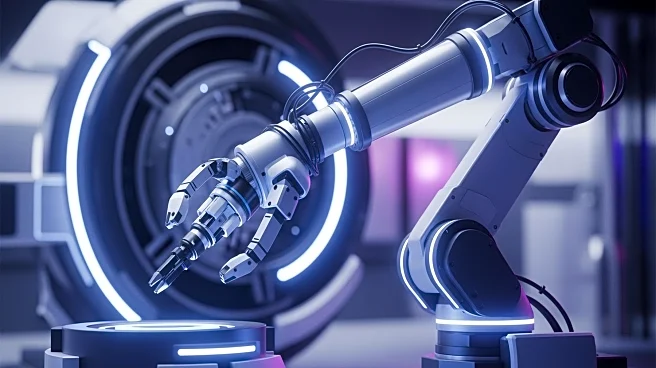What's Happening?
Rivian has announced the launch of Mind Robotics, its second spin-off this year, focusing on the integration of artificial intelligence with robotics in manufacturing. Mind Robotics aims to leverage Rivian's data to create a closed-loop system in robotics,
enhancing operations in the physical world. The company has secured approximately $110 million in external seed funding to support this initiative. While specific details about Mind Robotics are limited, the company plans to provide further updates. This development follows Rivian's earlier spin-off of a micro-mobility initiative, Also Inc., in March 2025.
Why It's Important?
The launch of Mind Robotics highlights the growing interest in industrial AI and robotics, particularly in sectors like manufacturing, logistics, and data management. By integrating AI with robotics, Rivian aims to address the increasing demand for advanced solutions that can optimize industrial operations. This move could potentially position Rivian as a leader in the industrial AI space, offering new opportunities for innovation and efficiency. The substantial seed funding indicates strong investor confidence in the potential of Mind Robotics to transform industrial processes.
What's Next?
Rivian plans to provide more information about Mind Robotics in the coming months, including potential applications and impacts on its existing workforce. The trademark application for Mind Robotics has been filed, suggesting that the company is preparing for broader market engagement. Stakeholders in the industrial sector, including manufacturers and logistics companies, may closely monitor Rivian's progress to assess the viability and benefits of AI-powered robotics solutions.
Beyond the Headlines
The establishment of Mind Robotics could have long-term implications for the industrial sector, potentially leading to shifts in workforce dynamics and operational strategies. As AI and robotics become more integrated, companies may need to adapt to new technologies and processes, which could influence employment patterns and skill requirements. Ethical considerations regarding the use of AI in manufacturing may also arise, prompting discussions on the balance between automation and human labor.


















